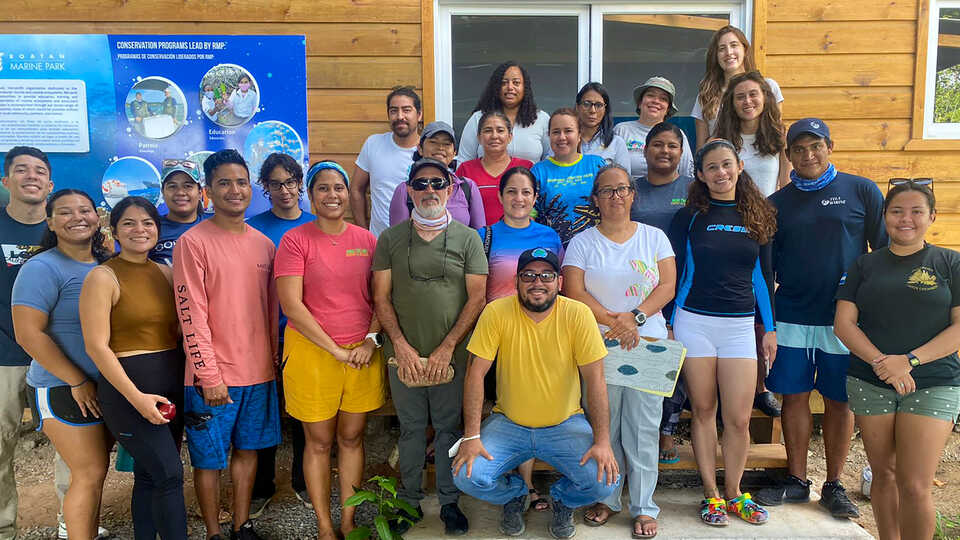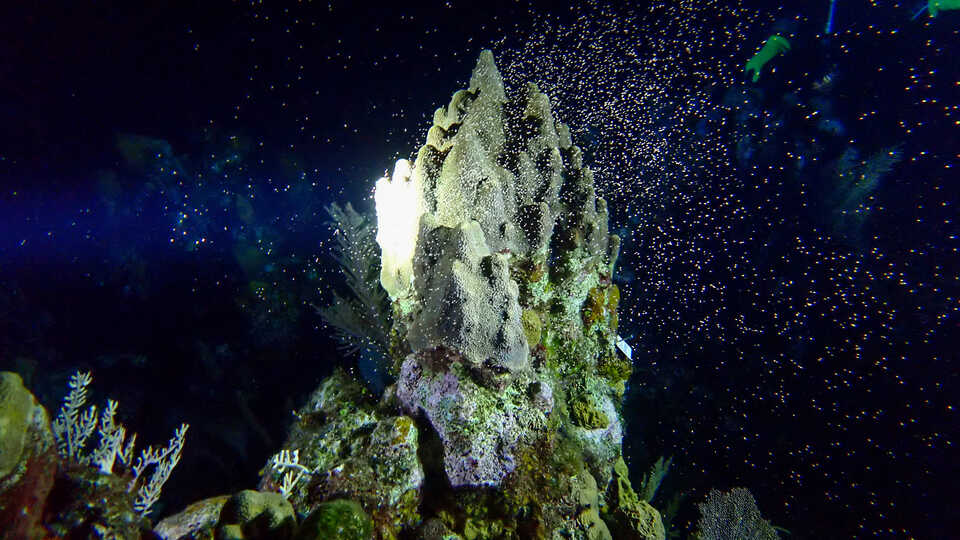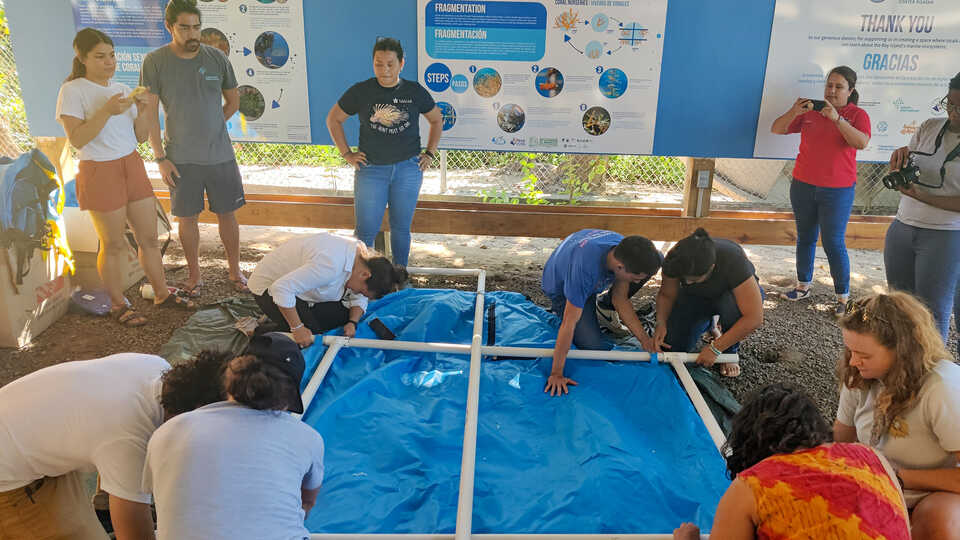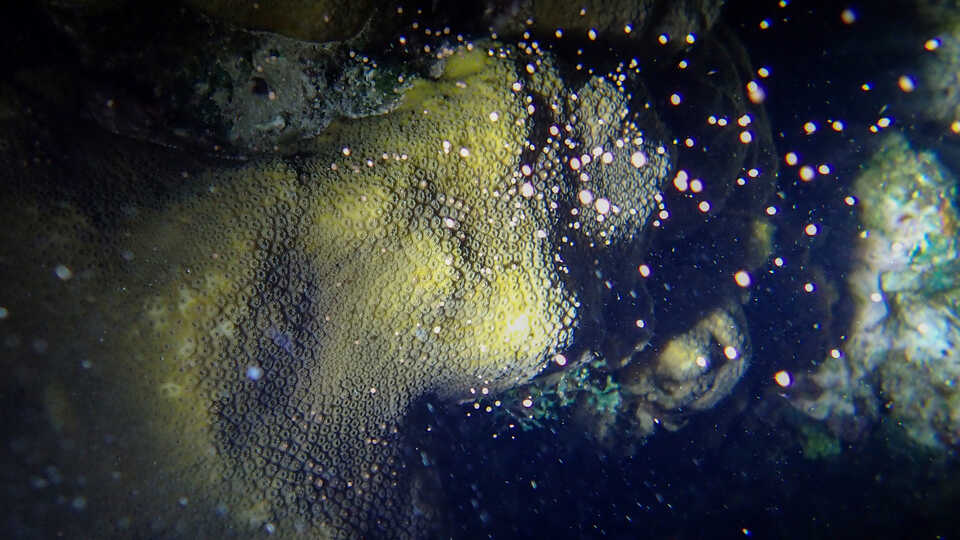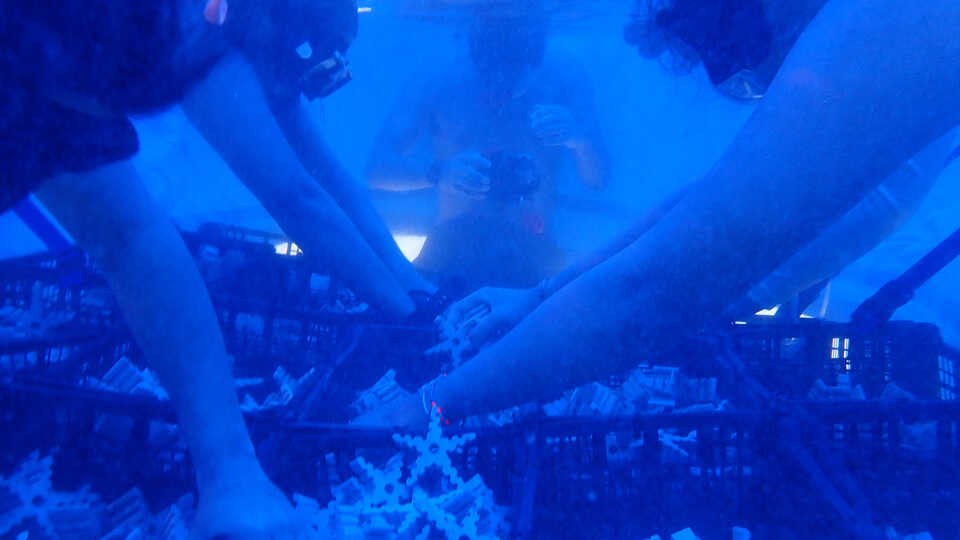The California Academy of Sciences is a renowned scientific and educational institution with a mission to regenerate the natural world through science, learning, and collaboration. Based in San Francisco’s Golden Gate Park, it is home to a world-class aquarium, planetarium, and natural history museum, as well as innovative programs in scientific research and environmental education—all under one living roof. Museum hours are 9:30 am – 5:00 pm Monday – Saturday, and 11:00 am – 5:00 pm on Sunday. Admission includes all exhibits, programs, and shows. For daily ticket prices, please visit www.calacademy.org or call (415) 379-8000 for more information.
Academy biologists helped train local researchers and marine protected area managers, co-develop research questions, and join coral spawning collection dives
ROATÁN, HONDURAS (September 27, 2022) — This month, coral biologists from the California Academy of Sciences in San Francisco joined an international cadre of organizations, including the Roatán Marine Park (RMP), SECORE International, German Agency for International Cooperation (GIZ), Mi Ambiente, and the Bay Islands National Marine Park (BINMP), for a two-week coral spawning and restoration training in Roatán, Honduras. The training program, which the Academy joined as part of its Hope for Reefs initiative to reverse the decline of Earth’s coral reefs by 2030, equipped local researchers with knowledge and best practices for rearing corals in human care, and facilitated the co-development of research questions that will be explored in the island’s first-ever coral restoration center—currently under construction—as scientists work to better understand and address threats facing local corals.
“We are thrilled to share this expertise and knowledge with marine protected area co-managers, and scale up coral restoration efforts to mitigate stony coral tissue loss disease impacts in Honduras,” says Roatán Marine Park Executive Director Francis Lean. “The past few days, we have seen the commitment and passion of each participant, to protect and conserve our marine ecosystems.”
"This partnership—and the island’s first coral restoration facility—opens up whole new research opportunities for the Roatán Marine Park,” says Academy coral biologist Elora López-Nandam, who attended the training. “It was wonderful collaborating with them to help co-develop research goals and questions that will provide localized and actionable insights to protect the marine park's coral reefs.”
This collaboration, implemented by GIZ on behalf of the German Federal Ministry for Economic Cooperation and Development, ultimately seeks to build coral restoration capacity in Caribbean countries. In order to achieve those aims, RMP organized the two-week training with SECORE International, GIZ, and Mi Ambiente, and, given the tremendous success of the Academy’s own coral rearing efforts in the Coral Spawning Lab, reached out to the Academy for additional support.
More than 20 local representatives, including biologists, managers of the Bay Islands, Tela, and Cayos Cochinos Marine Protected Areas (MPAs), and government officials, attended the training, where they learned:
- How to monitor coral spawning—specifically for the star corals Orbicella annularis and Orbicella faveolata, both of which are at-risk in the region due to a devastating outbreak of stony coral tissue loss disease
- How to set up Coral Rearing In-situ Basins (CRIBs), also known as a coral nurseries or coral kindergarten, which allow for the culturing and settling of coral larvae prior to outplanting to restoration sites
- How to perform assisted fertilization to increase the number of viable coral offspring that can be produced from spawning events
- The first steps for successful larval propagation
"This was a great opportunity to share what we've learned from spawning and raising corals in human care at the Academy with the Roatán Marine Park and other partners," says Academy biologist Lisa Larkin, who was also at the training. “Projects such as this, that involve local partners from the start and are on-the-ground in locations where corals are ailing, are critical for successful conservation.”
These efforts are just one part of the Academy’s continued collaborations with the Roatán Marine Park, which kicked off last June with a scientific expedition to the region’s mesophotic—or twilight zone—coral reefs. The Academy’s Hope for Reefs team will return to the island in 2023 to further co-develop research questions and education and outreach programs to help ensure a regenerative future for Roatán’s coral reefs.
To join the Academy’s coral reef work in Roatán and beyond, use #HopeforReefs on social media and follow @calacademy on Twitter, Instagram, and Facebook.
The Institute for Biodiversity Science and Sustainability at the California Academy of Sciences is at the forefront of efforts to regenerate the natural world through science, learning, and collaboration. Based in San Francisco, the Institute is home to more than 100 world-class scientists, state-of-the-art facilities, and nearly 46 million scientific specimens from around the world. The Institute also leverages the expertise and efforts of more than 100 international Associates and 450 distinguished Fellows. Through expeditions around the globe, investigations in the lab, and analysis of vast biological datasets, the Institute’s scientists work to understand the evolution and interconnectedness of organisms and ecosystems, the threats they face around the world, and the most effective strategies for ensuring they thrive into the future. Through deeply collaborative partnerships and innovative public engagement initiatives, they also guide critical conservation decisions worldwide, inspire and mentor the next generation of scientists, and foster responsible stewardship of our planet.
Press Contacts
If you are a journalist and would like to receive Academy press releases please contact press@calacademy.org.
Digital Assets
Hi-res and low-res image downloads are available for editorial use. Contact us at press@calacademy.org to request access.
